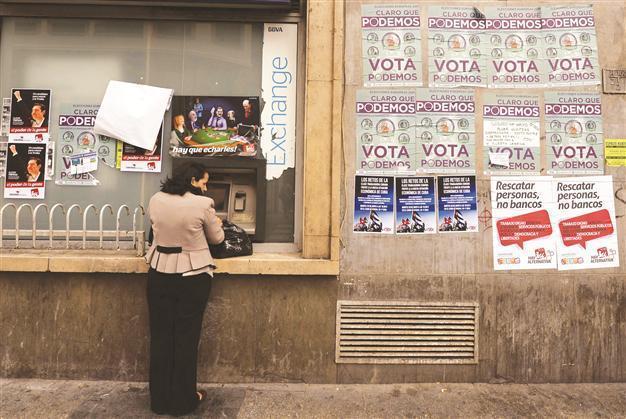EU polls cast shadow over eurozone stability
LONDON - Reuters

A woman withdraws money from an ATM next to posters for the European Parliament elections in Madrid. AFP Photo
Investors this week will be watching the results of elections that could deal a blow to political parties that are key to reform efforts in the European Union and could also fan instability in Ukraine.The bonds of some struggling eurozone governments sold off last week as investors worried about expected gains for anti-EU parties in European Parliament votes in Greece and Italy. In Greece, a strong showing by parties opposed to the terms of its EU-led bailout may hurt the fragile coalition government, potentially paving the way for a new national vote. In Italy, a poor result for Prime Minister Matteo Renzi’s party could undermine his drive for swift reforms, which he promised when he took power in a party coup earlier this year.
The rise of anti-EU parties in northern Europe could make it harder for the European Union to deal quickly with any future resurgence of the eurozone crisis, analysts said.
“It looks like we are going to see the far-right parties making further gains and it is going to make it more difficult for the European authorities to deal with any subsequent euro crisis events,” said Victoria Clarke, economist at Investec. Elections for the European Parliament were held from May 22 to yesterday. Ukrainians vote in a presidential election yesterday and if favorite Petro Poroshenko falls short of an absolute majority, market jitters could grow ahead of a second round of voting on June 15.
ECB expected to cut rates
“(If) we head to a second-round vote ... then we might find that we see risk assets suffering in the process until some form of stability has been put in place. So that could be a couple of quite painful weeks and would, if anything, reinforce the case for ECB policy easing on June 5,” said Clarke of Investec. The European Central Bank is widely expected to cut interest rates then, a Reuters poll showed, having clearly flagged that possibility at its last monetary policy meeting.
All this means a three-day ECB forum in Portugal that started yesterday and features President Mario Draghi and several ECB board members will be keenly watched by the markets.
Eurozone money supply data on May 28 and Italian and Spanish inflation numbers on May 30 may reinforce the case for more easing if they come in weak. “The euro area’s economic recovery is bedding in, but inflation is well below the ECB’s target and there is a risk that deflation could take hold across the region,” Standard Chartered said in a research note. “This could elicit more expansionary policy.”
But David Mackie, chief European economist at JP Morgan does not expect an ECB rate cut in June to be the start of a sustained campaign to provide more stimulus.
“We have not changed our broad macro story, which is that the region is heading towards a 2 percent growth environment,” he said. “So we don’t think that what will happen in June would then be followed by more aggressive action later in the year.”
















